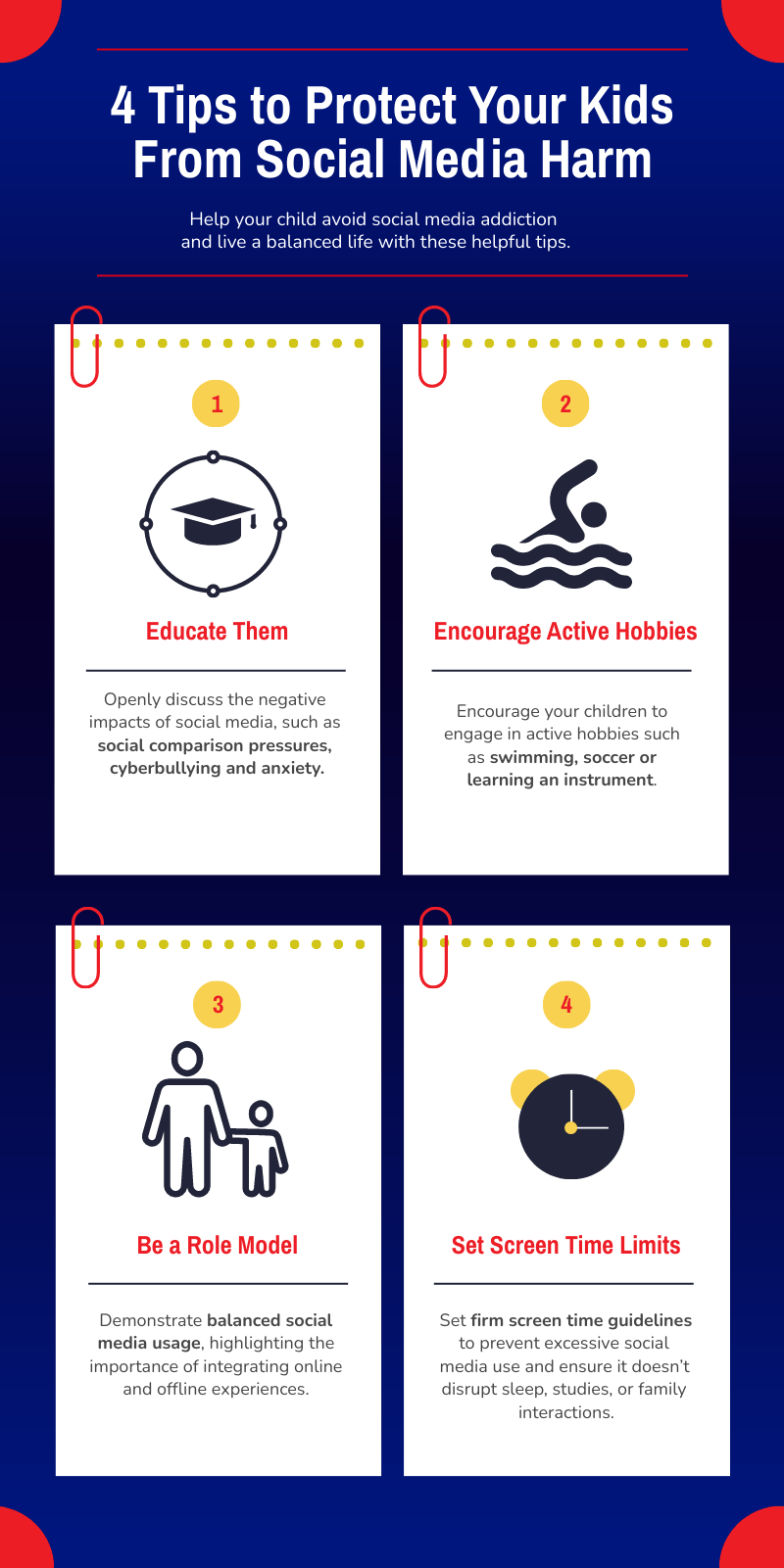Tips to Encourage Healthy Social Media Habits in Your Kids

You can’t avoid it. These days, no matter where you turn, you’re bound to see another child’s face glued to their phone, tablet or any other device that can grant them social media access.
It doesn’t seem too long ago that kids would enjoy playing outside, climbing trees and allowing their imagination to run wild. Nowadays, however, kids are gaining access to technology and social media faster than ever.
While this means present day kids have access to more educational resources than ever and have more potential to stay in touch with friends, it also has its drawbacks such as social media addiction. In our full guide, we’ll cover whether you should allow your child access to social media, its pros and cons, and tips to help your child stay smart about their usage.
The Possible Benefits of Social Media
While social media has cultivated a negative reputation, the truth is that it’s not all bad. Social media platforms are a great place for people to stay in touch with one another, cultivate new friendships and access educational content.
Some of the main benefits of social media include:
Education
Social media is a great hub to learn more about a variety of subjects. For example, you can search up a tutorial to do just about anything on YouTube. If your child has a question about their homework, there is likely someone out there with a comprehensive, easy-to-understand guide on that exact subject.
Social Connections
The obvious way social media is helpful to kids is by giving them a platform to connect to friends. They can connect with other kids who have similar interests or reach out to old friends they haven’t seen in a long time.
As your child grows, social media can also just be a great place for them to learn communication skills. Platforms often require reading comprehension, and instant messaging can help kids learn how to write more effectively.
Creative Expression
If your child has a creative skill that they’re interested in, sharing it over social media could be a great way to collect feedback. Positive feedback could then encourage them to stick with their passions and grow their skills. Who knows? Their passion might even transform into a career path for them down the road.
The Dangers of Social Media For Children
But social media isn’t just known for the advantages it can provide children. It also has severe downsides.
Cyberbullying
Unfortunately, kids don’t just compliment one another as they exchange messages through cyberspace. Since social media platforms often provide anonymity for its users, it empowers bullies to seek out victims to antagonize without repercussion.
During their online experience, your child could experience personal attacks, cyberstalking, spreading of false rumors and more. And since the cyberbullies don’t have to see their victims suffer in person, it can disassociate them from the impact of their actions.
Social Comparison
When your child browses social media, they can be exposed to a variety of worldviews. This has its benefits, in that it may help them be more open-minded or build empathy for others in different situations. However, it could also encourage a dip in their self-esteem.
Many on social media represent only the highlights of their lives. Your children may find themselves jealous as they scroll through the stories of other kids on lavish vacations or exciting adventures.
Oftentimes, particularly for teenage girls, they’ll compare their bodies to the models they come across on social media, and feel less comfortable in their own skin.
Addiction
Social media was designed with the objective to keep its users hooked. From the notification system to the infinite scroll feature, social media encourages users to keep using.
When screens are introduced early on in a child’s life as their brain is still developing, it can put them at higher risk for social media addiction. Excessive use can result in anxiety, overstimulation and eye damage.
Should You Allow Your Child Social Media Access?
The majority of children under the age of 18 are on social media in one form or another. In fact, 90% of parents with kids ages 5 to 11 report their child uses YouTube. While it is your personal choice how much you regulate your child’s social media usage, the most important thing is that you’re aware of its potential dangers.
Since most kids have access to social media, it can be difficult to keep your kid from using it altogether. In fact, doing so may even make it more difficult for them to fit in socially. Finding the right balance will be up to you.
4 Tips to Help Your Child Develop Healthy Social Media Habits
If you decide to allow your child to access social media, it’s important to set them up for success. There are a variety of things you can do to encourage healthy social media habits, such as:
1. Educating Them
Some children don’t understand the negative impact that social media is having on them until it’s too late. When you make it a point to educate your child about the potential pitfalls of social media early, it may help them control their usage in the long run.
You could start by watching a documentary with them on the subject of social media addiction. It’s also important to hammer home the dangers of social media such as cyberbullying and stranger danger. When your child knows what to look out for, they are better equipped to avoid negative outcomes.
2. Encouraging Outdoor Activities
It’s not uncommon for children to be stuck indoors all day with their faces buried in a screen. Because of how social media and video games are designed to be addictive, this isn’t necessarily their fault. Try your best to help your children find excitement in more wholesome, healthy activities.
You may want to sign your child up for a sport, or encourage them to audition in a play at a children’s theater. Follow your children’s interests. You may want to provide them with a list of possible activities and have them choose the ones they’d like to sign up for.
3. Setting Screen Time Regulations
Most phones come with features to regulate screen time on specific apps. This means, for example, that you could restrict your child’s Instagram usage to an hour a day. After the hour, their phone will no longer allow them to access the app.
Additionally, it’s a good idea to designate zones where no screens are allowed. For example, you might enforce the rule that no screens are allowed near bedtime. This can prevent your child from overindulging in stimulation before they sleep, causing them to stay up all night and experience grogginess the next day.
4. Practicing Healthy Habits Yourself
Your children are like information sponges. But they don’t just absorb verbal information, they also observe and mimic your actions. So if you say that it’s bad for them to overuse technology, but your face is glued to your iPhone 24/7, they might just follow in your footsteps.
The more you work to practice healthy social media habits yourself, the more likely your children are to do the same.
Conclusion
For kids, social media can be a blessing and a curse. While it’s great for building communities and exposing yourself to different viewpoints, it can also be a dangerous platform that encourages addiction and results in lifelong side effects.
To help your child develop a healthy relationship to online platforms, follow our tips outlined above. For more tips on how to encourage healthy social media usage, we’ve attached a helpful infographic below.



